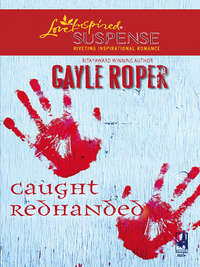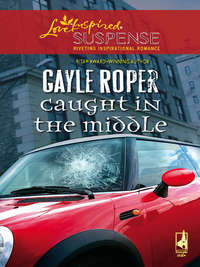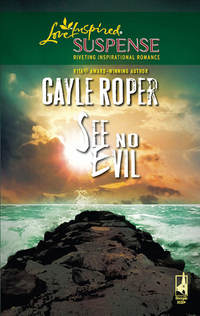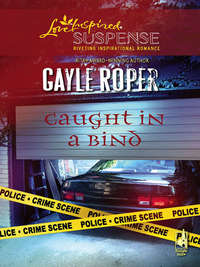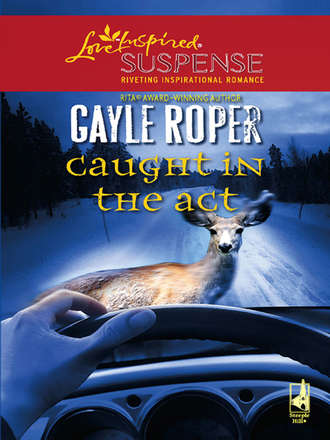
Полная версия
Caught In The Act
“I already assigned you Longwood Gardens at Christmas, right?”
I nodded. Longwood Gardens was a local wonder that I was to do a piece on for the December 26 issue, something I could write ahead, an informative filler that wouldn’t change, unless, of course, the conservatory decided to burn down or something.
“Good.” He nodded. “Don’t forget.”
I scowled at him. Like I’d forget an assignment.
He fumbled through one of his multiple stacks of papers. He grunted with satisfaction as he pulled a sheet free. “You know about His House?”
“Whose house?”
“His House.”
I looked at him blankly.
“You know. Like in God.”
“God’s house? Like church?”
“What’s church got to do with anything?” Mac looked as confused as I felt.
“Church is God’s house.”
“Oh, yeah. I guess it is. But I’m not talking about church. I’m talking about His House.”
We were back where we started.
“His House is a place for girls in trouble.”
“Ah,” I said. “In trouble with the law? With pregnancies? With their parents?”
“Probably all the above, but mostly with pregnancies. I want a tearjerker story on some of those girls. I want to wring the readers’ hearts.”
I nodded. I could do that.
“I want your story to be so compelling that our readers will admire these girls, no, will love these girls for their courage to carry their babies instead of terminating their pregnancies. I want heartbreaking stories of desperation and blossoming maternal love, of perseverance in the face of abandonment by families and, most terribly, by the babies’ fathers.” He rose from his seat, carried away by his own rhetoric. “I want the readers to cry!”
I stared at him in astonishment. Where had all this emotion come from?
He grinned sheepishly as he noticed not only me but Edie Whatley, the family page editor, staring at him.
“Lapsed Italian-Catholic guilt,” he explained as he sank into his new chair. “I’m conflicted over abortion. I’m conflicted over the Church. And Christmas always makes it all worse. I mean, what if Mary had aborted Jesus? Did you ever think of that?”
“Mac!”
“And then there’s all the other seasonal questions. Should I go to midnight Mass on Christmas Eve? It sort of makes me feel good to go, you know? But isn’t that hypocritical if I never go any other time? And shouldn’t you go to church to talk to God, not to get a warm seasonal buzz? But it’d make my mother happy. The question is: would it make God happy? And why would he want to see me after the way I’ve acted the rest of the year? If there is a God.”
I couldn’t help laughing at his expression, but I realized he was asking some very serious questions.
“Come to church with me on Christmas Eve,” I said.
“Are you asking me for a date?” He looked much too eager.
“Absolutely not, but you could sit with me.”
His eyes lit up.
“I wouldn’t want you to feel awkward in strange surroundings,” I said primly.
“Too kind, kid. Here.” He handed me the sheet of paper.
I read Dawn Trauber, Director, His House, followed by a phone number.
“Call her,” he instructed. “Set up an interview.”
I nodded. “Thanks. I agree with you. This will be a great story.”
“It better be, Schweetheart,” he said in his best Humphrey Bogart. “I may not go to Mass, but consider me the Little Drummer Boy bringing my gift of the story to the manger. You’re the drum I’m beating on, pa-rum-pa-pum-pum.”
I went to the file cabinet along the wall, slid the gigantic jade plant—now festooned with an equally gigantic red bow and white fairy lights—to the rear of the cabinet, and dived into the H drawer. Certainly the clipping service had something for me on His House. I pulled the information out.
I carried the file back to my desk by way of the soda machine. As I walked past, I tossed my head. Just that quickly I was attacked by the great grape ivy. Its tentacles reached out and wrapped themselves about my spiky hair, twisting and twining themselves until I was imprisoned against the dollar slot.
My file fluttered to the floor. I gurgled in outrage and began struggling, though I didn’t want to be too rough because I was more afraid of Jolene, the mad gardener, than I was of the plant. But I didn’t want to be dinner for a carnivorous organism, either. So I pulled and twisted, and no sooner did I get one spike free than another fell prey to the shoots.
I could just see the headline: “Reporter Vined to Death. ‘But it seemed such a nice plant,’ friends say.”
As I struggled, a tendril reached down the back of my collar and wound itself around my neck. I felt it begin to choke me.
“No!” I lashed out wildly. I felt my feet slip on some downed leaves just as Jolene and Mac reached me. I grabbed for them to keep from slamming to the floor, but they calmly sidestepped me and grabbed the falling grape ivy instead. I hit the floor with a great thud, but all I heard was, “Thank goodness! We caught it just in time.” That was Mac.
“Merry! What were you thinking? You might have harmed it.” That was Jolene.
As I sat there with my skirt around my ears and my hip announcing its fury at my inconsiderate treatment, Mac and Jolene patiently unwound the vines from my hair and with a great show of concern put the plant back on the soda machine.
“Poor thing,” Jolene murmured as she patted the villainous tendrils of green.
Snarling, I grabbed my fallen file, pulled myself to my feet and limped back to my desk.
A minute later a laughing Mac stood beside me offering a peace Coke. The absurdity of the whole thing struck me just as I took my first swallow. Mac had to swat me on the back several times to prevent me from choking.
“You made my day, Merry,” he said as he walked away. “You made my day.”
In the work situation, all I ever wanted was to be a consummate professional. Well, professionals are people who please their bosses, right? I perked up a bit.
I went into our e-files to supplement the His House paper file, which wasn’t exactly fat, and between the two sources found several news articles, many of them about local church women’s groups who had showers and in-gatherings to benefit the House. There were several pictures of smiling women sitting behind stacks of hand-knit baby sweaters and blankets while boxes of diapers rose like block towers beside them. There was a picture of the House itself, a huge, old Victorian just east of town.
I looked carefully at a picture of the director, Dawn Trauber, woman around thirty who reminded me of Katie Couric. Same nice face. Same warm smile.
According to the article that chronicled her coming to His House, Dawn had wonderful credentials. She had a degree in social work from Philadelphia Biblical University and an MSW from Temple University in Philadelphia. She had worked for several years as a houseparent at a children’s home near Lancaster. According to the article, she had now been in Amhearst three years.
There was nothing in either file about any of the girls who stayed there.
As I thought about it, I wasn’t surprised. If I had to stay in a facility like His House, I didn’t think I’d want my story and picture splashed all over the local paper. Obviously I couldn’t keep my situation a secret. I might not even want to. But to let a bunch of strangers in on it was another whole issue.
Well, Lord, you’re going to have to help me find a way to do this story. I don’t think it’s going to be easy.
I called His House and asked to speak with Dawn Trauber. When she came on the line, I explained who I was.
“I’d like to do a holiday story about some of your girls. You know. Coping with extraordinary circumstances at a time of year that’s often difficult in the best of situations.”
“Well,” Dawn said, drawing the word out. I could hear the reluctance. “Certainly you can speak with me and certainly you can find out all you want about how we operate. As far as talking to the girls themselves, though, I don’t think it’s a good idea.”
“What if one or two are willing to speak with me?”
“We’ll see. Come out and let me meet you. I need to assess whether I can trust you.”
We made an appointment for the next morning, and I hung up uncertain whether this drum was going to rum-pa-pum-pum.
Suddenly Jolene stood at the side of my desk. I looked at my watch. Exactly 5:00 p.m.
“Ready?” she asked. She smiled sweetly if somewhat vaguely at me, the very picture of a lovely, somewhat ditzy woman without a care in the world. In other words, she had returned to the woman I worked with each day. Gone was the mad gardener who let me fall while she saved her plant or the shrew who so masterfully dissected Airy at lunch.
Airy. What was it short for? Arianna? Ariadne? Arabelle? Certainly not Aristotle.
“What’s Airy’s real name?” I asked as I tucked all the clippings into the His House file and slipped it back into its place in the H drawer. “And how does she spell it?”
“Airy?” She sounded as if she’d never heard of anyone by that name.
“You know,” I prompted, “the woman we met in the ladies’ room.” Though come to think of it, I hadn’t met her. No one had been in an introducing mood.
“Oh.” Jolene nodded in “sudden” remembrance. “Valeria.”
“Valeria?”
Jolene nodded. “Valeria Lucas Bennett. Sounds high society, doesn’t it?” And she laughed sarcastically.
I shrugged my red coat on, and we left The News by the back door. Jolene talked as we crossed the parking lot behind the building.
“She was Val until I started calling her Valentine’s Day when we were in first grade. Valentine’s Day, go away. Don’t come near for another year.” Jolene sang the rhyme. “She decided she didn’t like Val anymore. I suggested Larry from Valeria. She said that was a boy’s name. Then I told her she should be A-i-r-y, like a breeze floating wherever she wanted to go. Airy, Airy, quite contrary, How does your garden grow? With weeds and seeds scratching your knees and ugly prickers all in a row.”
I shuddered for poor Airy as I unlocked my car doors. We climbed in and I cranked the heater as high as it would go.
Jo loosened her scarf. “Airy and I sat next to each other all through school. Lucas and Luray—that’s our maiden names. By the way,” she said as I turned toward her parents’ home, “I need to stop off at my house for a minute.”
“Oh.” I thought of her very upscale condominium in the new development on the old Greeley farm south of town, fifteen minutes from here. How like her to neglect to mention this little detour until now.
“I don’t mean the condo,” she said, reading my mind, a trick of hers I found very disconcerting. “I mean my house. I need to see Arnie, and he’s there.”
“You have a house and a condo?”
She looked at me as if to say, “Doesn’t everyone?”
“How long will this take?” I knew I was committed no matter how long it took. After all, she was already sitting in my car.
“Not long. No more than fifteen minutes.”
“To get there or to talk with Arnie?”
“Yes.”
Sighing softly, I told myself that I wasn’t being taken advantage of, that I liked going miles out of my way. After all, I had nothing better to do, unless you counted eating dinner, petting Whiskers or relaxing a minute before running out again to take a picture of the committee for the Amhearst Annual Christmas Food Project, or AAC-FOP as Mac called it.
Fifteen minutes later we pulled up before a gorgeous, gigantic mansion—I couldn’t think of any other word for the glorious vision in front of me. “This is your house?”
“Yeah, it’s mine.” She climbed out of the car.
“Wow!” I wondered about Jolene with her cloying lily of the valley perfume and big hair. Thoughtfully I glanced at her coat. Maybe that wasn’t faux fur after all.
The house drew me. Light streamed in wide ivory ribbons from Palladian windows and picture windows, bow windows and plain old regular windows, casting a golden glow on perfect shrubbery and a winding brick driveway and front walk. Through one large window a Christmas tree trimmed in little white lights twinkled from its place next to a sofa bigger than my entire apartment. A chandelier that looked like it would fit in well at the White House shone through the great window over the double front door.
“Look at all those lights,” Jolene said in disgust.
“They’re wonderful,” I said, mesmerized.
She gave her unladylike snort. “Arnie loves lights. When he was a kid, they didn’t have any money. I mean none. His mother would only let them have one light on at a time, and that was a sixty watt. Now he puts on every light in the house, all a hundred watt. You need sunglasses at midnight! ‘I can afford it,’ he yells. ‘Don’t you turn a single switch off!’”
I grabbed my camera from the backseat. At least I wouldn’t have to worry about using a flash.
“Has the paper ever done a feature on this place?” I asked. I could see it as the first in a series of Great Homes of Chester County, some new like this, some historic, some remodeled places like the barn over on Route 322. I’d have to talk to Edie Whatley, the home page editor. This was more her territory than mine, but I’d love to do such a series.
I stopped halfway up the walk and stared at the magnificence of it all. “Why live at your condo when you have this?”
“Because Arnie goes with this.”
I’d never met Arnie, but how bad could the man be if he could provide all this electricity? “Why did you two break up, Jolene?”
“Irreconcilable differences.”
“Yeah? What about?” I leaned to the left, peered into the dining room and admired the crystal chandelier over the mile-long cherry table. I stared at the silver tea service sitting on the sideboard. Like Jolene ever served tea.
Suddenly I could hear my mom, loud and clear.
Merrileigh Kramer! What are you doing, asking such personal questions about the demise of Jolene’s marriage? How rude can you get? Apologize right this instant!
It’s the opulence, Mom. It threw me.
It’s greed, Merry. And poor manners-which you never learned from me.
I placed a hand on Jo’s arm. “I’m sorry. I had no right to ask what went wrong. That’s your private concern.”
“I don’t care,” she said. “Everyone asks. Even my parents.” She turned and opened the door.
I blinked. Even her parents? If I ever separated from a husband, should I ever actually get one, my parents would be first in line asking why. And I’d better have a very good reason, too.
I followed Jolene inside, my heels click-clicking on the parquet floor of the entry foyer. Ahead of us, rising to the second floor in a great curving sweep, was a staircase worthy of Scarlett and Rhett.
The foyer walls were covered with a yellow and cream floral sateen with thin navy stripes running through the pattern. I reached out a finger, and it bounced on the batting beneath the fabric. This was real class.
Jolene ignored the beauty of it all and kept talking. Of course she’d seen it all before.
“Arnie and me had differences over everything.” She waved at the foyer chandelier. “Electricity. Me working. Eating dinner at my parents.” I knew Jolene ate there every night. “Where to go on vacations. What wallpaper to pick. Can you believe he hated this?” She pointed at the fabric.
Arnie was obviously a philistine.
“Then we couldn’t decide whether to buy a weekend place down the shore or up the mountains. And he couldn’t decide on fidelity.”
I was so busy photographing the yellow living room with its pale yellow carpeting and its accent wall of navy paper patterned with white daisies that I almost missed Jolene’s last comment.
I lowered my camera and looked at her with compassion and sympathy, but she was stalking across the foyer toward the back of the house, apparently uninterested in my commiseration.
“Arnie!” she bellowed. “Where are you? I haven’t got all day. Dinner’s waiting and you aren’t invited.”
I followed her, my head swiveling as I walked. Suddenly I stopped before a painting of a Chester County stone farmhouse surrounded by snow-laden evergreens. I checked the bottom right corner, though I already knew what I’d see. Curtis Carlyle. GTG.
“Jolene, you’ve got an original Carlyle! How come you never told me?”
She stopped and turned to look at the picture. She shrugged. “I forgot. But I’ve got a question for you. What’s that GTG thing in the corner after his name?”
“He puts that on all his work. It stands for Glory to God.”
She looked at me without comprehension, then at the picture.
“It means that he’s thanking God for the talent and opportunity to paint,” I explained.
“Oh.” She looked at the picture once more, shrugged again, and continued her trek across the vast expanse of foyer.
I stretched out my hand and traced Curt’s name and the GTG. What a great guy he was.
I turned back to Jolene just as she entered the kitchen. In profile she was as beautiful as she was full on. I raised my camera, flicked the switch to continuous exposure, and pressed.
As the lens click-clicked, she stopped abruptly, frozen. I heard a quick intake of breath and saw a flash of tightening jaw through the viewfinder. Then she let out an unearthly shriek.
“Arnie!” She ran into the kitchen, out of my line of sight. “No! No! Arnie!”
The hairs on my arms rose at her tone, and I ran into the kitchen myself. I froze for an instant, too.
On the floor by the stove lay Arnie, staring upwards, blood puddling beneath and beside him on the yellow tiles. Jolene knelt in the blood, shaking him, calling him, trying to rouse him.
She would never succeed.
THREE
Poor Arnie. He would never need all his lights on ever again.
I set my camera on the table, ran to Jolene and caught her by the shoulders.
“Jo, come on away from him,” I said softly. “The police won’t want us to touch him or move him.”
“Merry, we’ve got to help him!” Her brown eyes shimmered with tears and pain. “CPR! Do you know CPR?”
I knelt and hugged her. I could feel the sticky blood beneath my knees. “Jo, it won’t help. He’s dead.”
“No, he’s not!” She reached for him again. “He’s still warm.”
I pulled her hands back. “He’s dead,” I repeated softly. “Someone has killed him. We don’t want to move him or do anything that would cover up evidence.”
She stared at me. “Someone killed him?”
We turned together and looked at Arnie. He stared blindly at the ceiling, gravity pulling his eyelids back into his skull. His shirtsleeves were rolled up to the elbows and one pant leg was crumpled about his calf. There was a round hole in the left lower chest area of his tan button-down shirt, not far below his heart. Blood had soaked his shirt front, though it wasn’t flowing anymore. Arnie’s heart no longer pumped.
I didn’t want to think about the exit wound beneath him from which blood must have rushed in a torrent. It was hard to comprehend that the great pool of it covering the yellow tiles had recently flowed through his veins as surely as mine swept through my body.
“Come away, Jo.” I stood and pulled her up with me. “We need to call the police.”
I led her to the kitchen table and pushed her into a chair. I grabbed the wall phone and dialed 911.
“Jo,” I said as I hung up in spite of the fact that the 911 voice wanted me to stay on the line. “Is there someone else we should call?”
She looked at me blankly. “Like who?”
Many days I wondered about Jo’s mental acuity, but tonight I knew the slowness was shock. “Like Arnie’s parents. Brothers and sisters. Pastor. Your parents.”
“Oh.” She shook her head. “He didn’t have a family. His mom’s dead and his dad disappeared when he was four. There are no brothers and sisters. And there’s certainly no pastor.”
She sighed in pain. “I have to tell my parents face-to-face. It’s not telephone news, you know? My dad will be so upset. He loved Arnie. He was the son he never had.” She shook her head. “Poor Dad.”
I looked at the man on the floor. Poor Arnie was more like it.
Since Jolene had no calls to make, I quickly dialed The News, connecting with Mac’s desk.
“Mac, I’m at Jolene and Arnie Meister’s house where we just found Arnie shot to death.”
He made a distressed sound. “Let me talk to her.”
I gave Jolene the phone and listened to her murmur into it. Suddenly she held it out. “He wants you.”
“You know what you’ve got to do, right?” Mac asked.
“Yeah, I know.” A story by deadline tomorrow. The News is an afternoon paper of twelve to sixteen pages, and our deadline for news is nine, editing ten, and it’s ready for delivery by noon.
I hung up and led Jo to the foyer, away from Arnie. “Come on. We’ll wait in the living room.”
She kept wiping her bloody hands down her coat again and again. I caught them and held them and felt them shaking.
She looked over my shoulder. “He has the tree up.” She took a step toward the living room.
“Give me your coat before you go in there.” There was no need to track blood through the house. I helped her slip out of it.
I took mine off, too, and we dropped them in a pile on the parquet floor. Then we sat awkwardly next to the beautiful Christmas tree on the sofa bigger than my apartment. But there was blood on our shoes and clothes as well as our hands, and we marred the pale yellow carpet and the huge sofa. Jolene never noticed.
She stood up almost as soon as we sat down. “I can’t leave him alone on the kitchen floor.” Tears wet her cheeks. She started unsteadily toward the kitchen.
I nodded and followed her. “We’ll sit at the table.”
“I want to hold his hand.”
I remembered Sergeant William Poole of the Amhearst police saying to me once, “The first rule of any investigation is never touch anything at a crime scene. Never, never, never! It contaminates the evidence and makes convictions hard, should we find the perpetrator.”
“I think we can’t touch him, Jo. I’m sorry.” I led her to a kitchen chair with a yellow plaid seat cushion.
She sat and laid her head on her arms on the table. I looked at her sadly, wishing I could ease her sorrow and knowing I couldn’t.
I turned to the room. Putting my hands behind me, I made a slow circle, looking at everything and anything. Who knew what would be important for my story? Or for the solution of the crime?
“Jolene,” I said hesitantly. “I’ve got to take pictures.” It seemed so intrusive to go flash, flash here and flash, flash there.
She raised her head. “For the paper?”
“Yes. But also to reconstruct the scene and look for possible clues.”
She gave me a watery, wavery smile. “You’ve got the detective bug.”
“Sort of,” I confessed, blushing at the actual verbalizing of that thought. How pretentious of me, though I had actually solved another murder. “But I won’t take any pictures if you don’t want me to.”
“The cops are going to photograph him, aren’t they?”
I nodded.
“Then you might as well, too. Just don’t put him in the paper like that.”
“I’ll tell Mac,” I promised.
I picked up my camera and began circling the room. As I walked, I talked, as much for myself as to keep Jo from falling prey to greater shock.
“How’d you meet Arnie?” I snapped the refrigerator and the couple of notes that were held to it by magnets shaped like fruit. One note from a scratch pad said: Jolene—5:30. The other, an 8x10 printout on a certificate template, read: $50,000.00!
Jolene looked at Arnie. “We met the first day of kindergarten. He was this shrimpy little kid with big glasses and a bigger mouth. He liked to boss everyone around. I hated him.”
I glanced at Arnie. “He’s no shrimp now.”
Jolene shook her head. “But he was all through high school. The littlest guy around. Mr. Brainiac. He and Airy were quite the pair. Two dweebs.”


